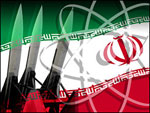 Reuters: The head of the U.N. nuclear watchdog said on Monday that Iran had begun to engage substantively with a long-thwarted probe into suspected atom bomb research, but that more was needed to clear up his concerns.
Reuters: The head of the U.N. nuclear watchdog said on Monday that Iran had begun to engage substantively with a long-thwarted probe into suspected atom bomb research, but that more was needed to clear up his concerns.
By Fredrik Dahl

VIENNA (Reuters) – The head of the U.N. nuclear watchdog said on Monday that Iran had begun to engage substantively with a long-thwarted probe into suspected atom bomb research, but that more was needed to clear up his concerns.
Describing the investigation as a “jigsaw puzzle”, Yukiya Amano made clear that it would not be finished before the July 20 deadline that Iran and six world powers have set for the conclusion of broader talks to settle a long-term dispute over Iran’s nuclear programme.
But Amano said he did not believe the major powers expected the International Atomic Energy Agency (IAEA) to finish its investigation by then. “That is not our timeline. It is their timeline. We will take the necessary time to resolve all the outstanding issues,” he said.
The IAEA’s inquiry focuses specifically on what it calls the possible military dimensions of Iran’s atomic activities, notably whether it has worked on designing a nuclear warhead, a charge it denies.
“I can understand the expectation from many countries and people to accelerate the process, and I myself would like to see a speeding up,” Amano, the IAEA’s director general, told a news conference.
“Iran has engaged with the agency substantively, including in the clarification of issues related to the use of exploding bridge wire detonators,” he earlier told a closed-door meeting of the IAEA’s 35-nation board of governors.
The Islamic Republic says its uranium enrichment programme is a peaceful energy project, but the West fears it may be aimed at developing a nuclear weapons capability. Western diplomats have long accused Iran of stonewalling the IAEA’s investigation.
U.S. officials say it is vital for Iran to address the IAEA’s concerns if the United States, France, Germany, Britain, China and Russia are to reach a long-term accord with Iran, setting a framework for its nuclear activity and ending international sanctions.
If needed, the sides can agree to extend the negotiations beyond the July target date, and some experts say this is looking increasingly likely in view of the big differences that need to be bridged.
PARALLEL TALKS
The two sets of talks are separate but complementary as both focus on suspicions that Iran may covertly have sought the means and expertise to assemble nuclear weapons.
For several years, the IAEA has been investigating suspicions that Iran may have coordinated efforts to process uranium, test explosives and revamp a ballistic missile cone in a way suitable for a nuclear warhead. Iran says the allegations are false but has offered to help clarify them.
After years of increasing tension with the West – and fears of a new Middle East war breaking out – last June’s election of the pragmatist Hassan Rouhani as Iranian president paved the way for a dramatic thaw in relations. However, the sides remain far apart on what a long-term nuclear agreement should look like.
Amano said Iran’s cooperation with the U.N. agency under a step-by-step “Framework for Cooperation” agreed in November – which includes greater access and more information – had helped the IAEA “gain a better understanding” of the programme.
The relatively upbeat remarks suggested that he was becoming more hopeful of finally making headway in the investigation, despite Iran’s continued refusal to provide access to the Parchin military base, where the IAEA suspects that nuclear-related explosives tests may have taken place.
Last month, Iran gave the U.N. watchdog information it had requested about one of the issues that are part of the IAEA’s inquiry. Bridge wire detonators can be used, among other things, to set off an atomic explosive device. Iran also agreed to address two other areas of the investigation by Aug. 25.
Western capitals, aware of past failures to get Iran to cooperate with the IAEA, are likely to remain sceptical until it has fully addressed all allegations of illicit atomic work.
Amano also underlined the need for more Iranian cooperation with the IAEA. “In order to resolve all outstanding issues, past and present, it is very important that Iran continues to implement the Framework for Cooperation,” he said.
(Editing by Kevin Liffey)


